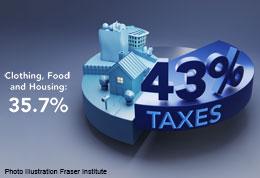Canadians being taxed to the max

By Mata Press Service
The average Canadian family spent 43 percent of its income on taxes in 2021—more than housing, food and clothing costs combined, finds a new study released today by the Fraser Institute, an independent, non-partisan Canadian public policy think-tank.
“Taxes remain the largest household expense for families in Canada,” said Jake Fuss, Associate Director of Fiscal Studies at the Fraser Institute and co-author of Taxes versus the Necessities of Life: The Canadian Consumer Tax Index 2022 Edition.
In 2021, the average Canadian family earned an income of $99,030 and paid in total taxes equaling $42,547. In other words, the average Canadian family spent 43.0 percent of its income on taxes compared to 35.7 percent on basic necessities.
This is a dramatic shift since 1961 when the average Canadian family spent much less of its income on taxes (33.5 percent) than the basic necessities (56.5 percent).
Taxes have grown much more rapidly than any other single expenditure for the average Canadian family.
The total tax bill for Canadians includes visible and hidden taxes (paid to the federal, provincial and local governments) including income, payroll, sales, property, carbon, health, fuel and alcohol taxes.
Moreover, since 1961, the average Canadian family’s total tax bill has increased nominally by 2,440 percent, dwarfing increases in annual housing costs (1,751 percent), clothing (643 percent) and food (790 percent).
“Considering the sheer amount of income that goes towards taxes in this country, Canadians may question whether or not we’re getting good value for our money,” Fuss said.
Here are the key findings;
- The Canadian Consumer Tax Index tracks the total tax bill of the average Canadian family from 1961 to 2021. Including all types of taxes, that bill has increased by 2,440% since 1961.
- Taxes have grown much more rapidly than any other single expenditure for the average Canadian family: from 1961 to 2021, expenditures on shelter increased by 1,751%, clothing by 643%, and food by 790%.
- The 2,440% increase in the tax bill has also greatly outpaced the increase in the Consumer Price Index (802%), which measures the average price that consumers pay for food, shelter, clothing, transportation, health and personal care, education, and other items.
- The average Canadian family now spends more of its income on taxes (43.0%) than it does on basic necessities such as food, shelter, and clothing combined (35.7%). By comparison, 33.5% of the average family’s income went to pay taxes in 1961 while 56.5% went to basic necessities.
- In 2021, the average Canadian family earned an income of $99,030 and paid total taxes equaling $42,547 (43.0%). In 1961, the average family had an income of $5,000 and paid a total tax bill of $1,675 (33.5%).
Meanwhile, a report released by the Canadian Taxpayers Federation (CTF) said while Ottawa hiked taxes, 51 other national governments cut taxes during the pandemic to ease the burden of inflation.
“While Ottawa sticks Canadians with higher tax bills, other countries are doing the right thing and providing their citizens with much-needed relief,” said Franco Terrazzano, Federal Director of the CTF.
“Prime Minister Justin Trudeau should follow the lead of other nations and make life a little more affordable by cutting taxes for Canadians.”
The CTF identified 51 national governments that provided tax relief during the pandemic or to ease the burdens of inflation. National governments that provided tax relief include more than half of the G7 and G20 countries and two-thirds of the countries in the Organisation for Economic Co-operation and Development.
A total of 25 countries cut gas taxes, 15 countries cut energy taxes, 18 countries cut consumption taxes, eight countries cut income taxes and 11 countries cut business taxes. A number of countries reduced multiple taxes.
In addition to the 51 national governments that cut taxes, provincial governments such as Newfoundland and Labrador, Ontario and Alberta cut fuel taxes.
The government of Canada recently increased the carbon tax, alcohol taxes and payroll taxes. Although the federal government raised the basic personal exemption to increase the tax-free portion of incomes, if you make more than $40,000 your federal income tax bill is still going up this year due to rising payroll taxes.
“Ending the tax hikes while Canadians struggle with the pandemic and inflation should have been a no-brainer,” said Terrazzano.
“Trudeau could immediately make life more affordable by reducing his tax-take like so many other countries have done.”
As taxes choke the people, many Canadians are responding to price increases with spending decreases, according to new data from the non-profit Angus Reid Institute
Fully four-in-five say they have cut spending in recent months by either trimming their discretionary budget, delaying a major purchase, driving less, scaling back travel and charitable donations, or deferring saving for the future. This represents an increase from the three-quarters (74%) who said so in February.
A financial temperature check of Canadians finds many sweltering in the heat of inflation. Half (52%) say they couldn’t manage a sudden expense of more than $1,000. For two in five (38%), a surprise bonus of $5,000 would be used to alleviate the pressure of debt. For one in ten, it would immediately be put towards daily expenses.
Regionally, some parts of the country seem to be feeling more financial pain than others. Those in Saskatchewan (58%) and Atlantic Canada (50%) are much more likely than those in other parts of the country to use a sudden gift of $5,000 towards paying off debt. As well, people in those provinces – and Alberta – are more likely than others elsewhere to say they have been cutting back spending in re









